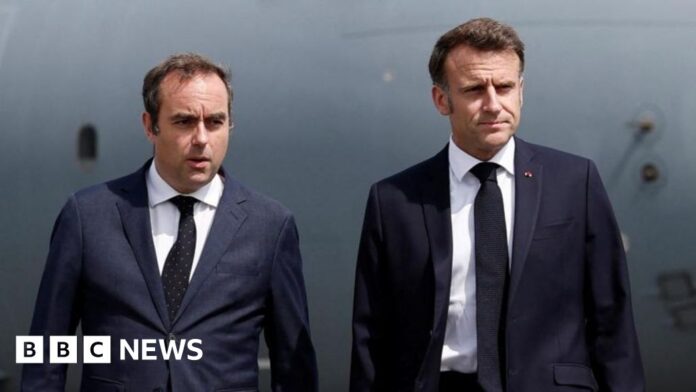France is facing further political chaos after the country’s latest prime minister, Sébastien Lecornu, resigned after just 26 days in the role.
Hours after quitting, Lecornu accepted a request from French President Emmanuel Macron to work on a plan for the “stability for the country” by Wednesday evening.
That unexpected twist capped a day of political upheaval which saw stocks fall sharply on the Paris exchange amid concerns over the political parties’ ability to tackle the country’s economic woes.
Lecornu’s shock resignation on Monday morning came the day after he unveiled his cabinet, and made him the third French PM to leave office since last December.
His ministerial line-up had been fiercely criticised across the board by parties in the National Assembly, which threatened to vote it down.
The nomination of former finance minister Bruno Le Maire as minister of the armed forces in particular seemed to be a sticking point for many political factions.
On Monday afternoon Le Maire said he was withdrawing from cabinet in a bid to end the crisis.
Shortly after the Elysee Palace announced Lecornu had been given another 48 hours to work out whether negotiations with political parties could result in a “stability plan” for France.
Lecornu was only appointed in September after François Bayrou’s government collapsed when MPs refused to back his budget.
Bayrou was himself installed after Michel Barnier was ousted last December.
The nation’s politics has been highly unstable since July 2024, when Macron called for snap parliamentary elections in a bid to achieve a clear majority following a bruising loss for his party in the European Parliament vote.
Instead the elections resulted in a hung parliament divided into ideologically opposed factions deeply at odds with one another and unwilling to work together.
Should Lecornu not succeed Macron will be ready to “take responsibility”, according to sources close to the presidential office quoted by French media.
Several parties are now clamouring for early elections and some are calling for Macron to go – although he has always said he will not stand down before his term ends in 2027.
The decision on how to proceed now rests with Macron, who must surely be asking himself how long this political charade can be allowed to go on.
If Lecornu’s bid to achieve “stability” by Wednesday fails, Macron has three options.
He can appoint another prime minister. He can once again dissolve the National Assembly. Or he can resign himself.
The last is the least likely, while the first would be his natural choice.
However, who now could he name to form a government? Lecornu – the ultimate Macron loyalist – was seen as his last resort, but now he too has failed.
He could appoint a Socialist, on the basis that the left deserves a go at government – but a Socialist administration would itself not take long to fall.
So the logic must surely be for option two: for new legislative elections.
The result would probably be a rout for the pro-Macron centre, and a big victory for the hard-right of Marine Le Pen. But when every other recourse fails, few avenues remain.
Lecornu, a former armed forces minister, was France’s fifth prime minister in under two years.
In his brief speech outside the Hôtel de Matignon on Monday morning, the prime minister’s residence which he only occupied for less than a month, Lecornu sharply criticised the “partisan appetites” of political factions, who he said “are all behaving as if they had an absolute majority”.
“I was ready for compromise but all parties wanted the other party to adopt their programmes in their entirety,” he said.
“It wouldn’t need much for this to work,” he added, saying, however, that parties needed to be more humble and “to cast some egos aside”.
The entrenched divisions in French politics have made it difficult for any prime minister to garner the necessary support to pass any bills.
Michel Barnier was appointed prime minister last September but was toppled within three months in a vote of no confidence.
The government of his successor François Bayrou’s too was voted down after nine months after parliament refused to back his austerity budget, which aimed to slash government spending by €44bn ($51bn; £38bn).
France’s deficit reached 5.8% of its GDP in 2024 and its national debt is 114% of its GDP. That is the third highest public debt in the eurozone after Greece and Italy, and equivalent to almost €50,000 per French citizen.


